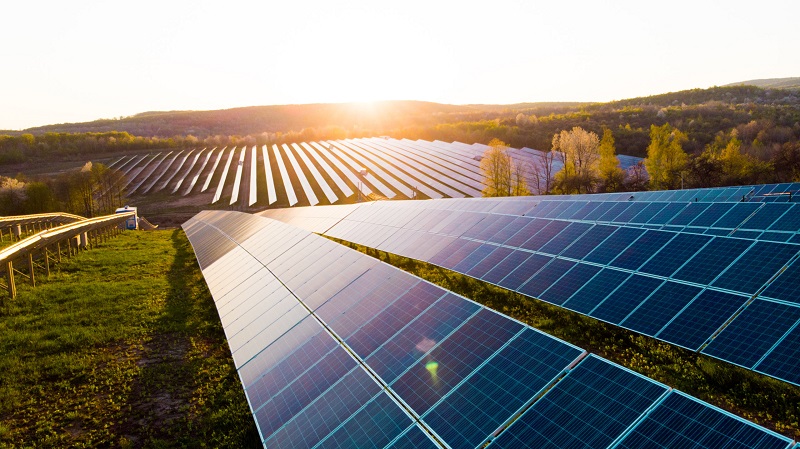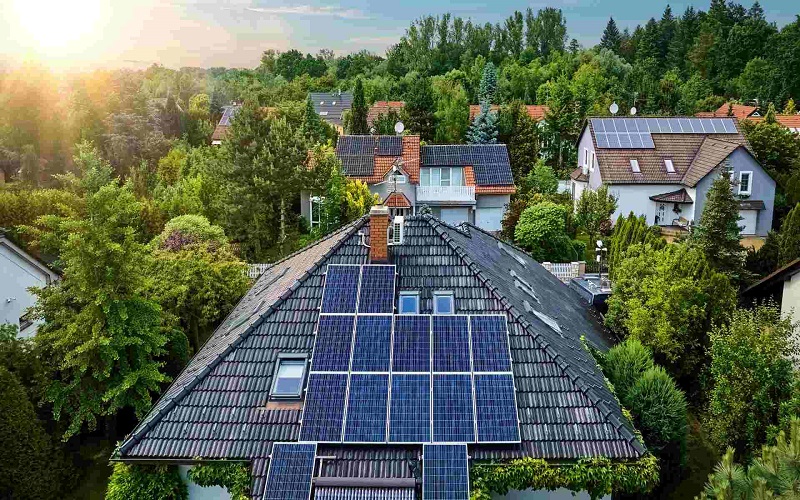Solar power is an inexhaustible source of renewable energy, generated from sunlight and heat. With solar panel technology and storage systems, this energy can be converted into electricity for use in daily life and production. In this article by Alternō, let’s learn more about what is solar power, its classification, advantages, disadvantages, and applications!
1. What is solar power?
Solar power is energy generated from the light and heat of the sun. It is a renewable, inexhaustible, non-polluting, and environmentally friendly source of energy. Through solar panels, solar energy can be converted into electricity or used directly to heat water and space. One of the biggest benefits of solar power is its ability to reduce dependence on fossil fuels and save on electricity bills.

2. Types of solar energy
Thermal solar and photovoltaic solar energy are the two most popular types of solar power, as detailed below:
2.1. Photovoltaic solar
Solar panels are used in this energy source to transform sunlight into electrical power. Photovoltaic panels contain photovoltaic cells that absorb sunlight directly and generate direct current. This direct current can then be converted into alternating current for use in homes and industries.
2.2. Thermal energy
This is a type of energy that uses solar panels to absorb solar radiation and convert it into heat energy. These collectors are used to receive and store solar radiation and then apply it to water heating systems or space heating in residential and industrial areas.
3. Advantages and disadvantages of solar power
Solar energy has many outstanding advantages, contributing to environmental protection and improving the quality of life. The following are some of the primary advantages of solar power:
- Renewable and endless energy: Solar energy is an endless, renewable energy source that is not exhausted.
- Cost savings: Using solar power helps reduce electricity bills significantly, without fuel costs, especially for households and businesses during peak seasons. In addition, if not used up, it can be sold back to the national grid.
- Environmental protection: Instead of using fossil fuels, using solar energy helps reduce CO2 and other pollutants in the air, contributing to environmental protection and public health.
- Create many job opportunities: The solar energy industry is growing strongly, creating many jobs in the fields of installation, maintenance, and research and development of new technologies.

While solar power offers many benefits, there are also some disadvantages to be aware of:
- Weather dependent: Solar power only works when there is sunlight, its performance will decrease at night or on cloudy, rainy days. This can make it difficult to maintain a stable source of energy in all weather conditions.
- High investment costs: Installing a solar energy system requires a large initial cost, including the cost of purchasing solar panels, storage systems, and installation. Although this cost has decreased in recent years, it is still a factor to consider for many households and businesses.
4. Applications of solar power
Solar energy has many diverse applications in daily life, from civil electrical systems to large-scale projects, helping to save energy and protect the environment. Here are some common applications of solar power:
- Electricity: This is the most common application of solar energy. It is capable of producing power from sunlight. Electricity is often used in households, and businesses or supplied to the national grid.
- Heating: Solar radiation can heat water, supply radiators and heating systems in the house.
- Water heating: Sunlight is also used to heat water by using solar panels and vacuum tubes to provide heat to heat water for daily use, helping to save electricity costs.
- Irrigation: In agriculture, solar energy can be used to operate water pumps, automatic irrigation systems, or power farm equipment without the use of fossil fuels.
- Lighting: Solar lights are widely used for outdoor lighting, such as in public areas, parks, or streets. These lights use solar batteries to charge during the day and provide light at night.
5. Some questions related to solar power
Some questions related to solar energy:
5.1. Is solar energy clean energy?
Solar power is an endless source of clean energy because the process of collecting and using energy does not create carbon emissions or pollutants, helping to reduce the impact of the greenhouse effect and climate change. In addition, solar powerdoes not pollute water and soil, completely different from fossil energy sources such as coal, oil, or natural gas.
5.2. How is solar power produced?
Solar panels are made of photovoltaic cells, typically made of silicon or other semiconductor material, mounted in a metal frame with a glass cover. When this material is exposed to photons of sunlight, it excites electrons in the silicon, creating direct current (DC). This current is fed into an inverter and converted into alternating current (AC).
5.3. Can cloudy days generate solar power?
Yes, although solar panels are most efficient when there is direct sunlight, they can still generate electricity on cloudy days. When it is cloudy, the sunlight is weaker, making the solar panel less efficient than on a bright sunny day. However, the rate at which panels generate electricity varies depending on the quality, size, quantity, and placement of the panels.
In short, solar energy is a clean, renewable energy source harnessed from the sun’s rays, reducing dependence on fossil fuels, reducing greenhouse gas emissions, and promoting sustainability. The above article is information shared about what is solar power, its classification, advantages, disadvantages, and applications for readers’ reference. Follow our Blog page to read more useful articles!



 Tiếng Việt
Tiếng Việt


